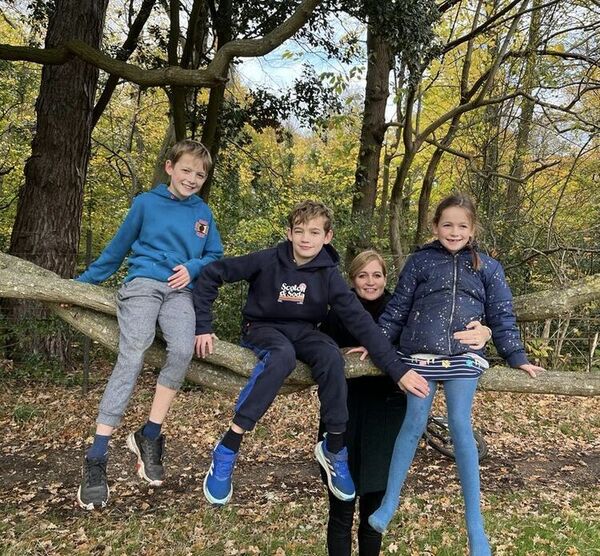Mel’s story: DHDDS variant
Mel is the founder of the charity Cure DHDDS, where she works full-time alongside her volunteer work at schools to support children with special needs. Mel has 3 children, 2 of which have an ultra-rare genetic change in their DHDDS gene. Following their diagnosis, Mel has done extensive work to build patient and scientific communities, raise funds for research, hold scientific conferences, and build an international patient registry.

About DHDDS variants
Variants in the DHDDS gene can cause a number of neurodegenerative conditions, including tremors, seizures, coordination and learning difficulties. The variant is ultra-rare, and was only classified as pathogenic in 2021, meaning little is known about it.
Only 59 documented cases worldwide
DHDDS declared pathogenic in 2021
Mel's story

When Mel noticed her son’s speech delay, reduced balance and tremors, she hoped he was just a late developer. Then at 4 years old he was diagnosed with dyspraxia, and later on, autism.
When the tremors became much more noticeable, the family decided it was time to see a neurologist, but all the tests came back negative. Mel said, “we hoped it was just a coincidence that he happened to have a tremor as well as learning difficulties.”
But things changed when Mel’s youngest daughter also started to show symptoms, and the family knew they should see a geneticist. They had lots of different genetic tests to try and find the cause, but still Mel and her family had no answers.
She said: “The geneticist was puzzled, as all of the most common explanations had been ruled out. We were starting to think that the genetic tests wouldn’t show anything at all”.
Getting a diagnosis
Two years later Mel and her children returned to their geneticist, who was concerned to see that the children’s symptoms were worsening. She encouraged them to get whole genome sequencing through the NHS Genomic Medicine Service.
Mel said: “I was nervous, but I felt I needed to know in case it was something that could be treated.”
14 months later, the family finally had answers. The symptoms were due to an ultra-rare neurodegenerative condition, caused by a variant in the DHDDS gene.
“At the time I wanted the test to come back with nothing, because I knew that lots of the conditions they were looking for were debilitating and often life limiting. We really didn’t want it to be neurodegenerative, but now that we have a diagnosis, we can put all our energy into trying to find a treatment and give our children a better life.”
Paving the way for a cure
At the time Mel’s children were diagnosed, the DHDDS gene variant had only just been named as a disease-causing gene. There was little understanding about it, and no direct treatment.
Following the diagnosis, Mel reached out to hundreds of scientists all over the world who were studying DHDDS or similar conditions. She connected with Professor Christian Theil from Heidelberg University, who recommended her children take certain vitamins. Mel said: “their tremors have reduced by 20-30% since they started taking them.”
Mel has done lots of work to build both patient and scientific communities, raising funds for research, building an international patient registry, holding scientific conferences and even founded the charity Cure DHDDS.
She said: “We juggle so many balls because we need to act quickly. The aim is to find a drug that can slow down the disease whilst we wait for tomorrow’s treatments, such ASO or RNA therapies.”
ASOs, or antisense oligonucleotides, are small molecules that bind to messenger molecules in our body. By targeting these messengers, ASOs can regulate the expression of disease-causing genes, slowing down or halting disease progression.
How can whole genome sequencing help families like Mel’s?
Getting a diagnosis through whole genome sequencing allowed Mel’s children to be accepted for ASO therapy with N Lorem. The aim of this therapy is to stop the progression of the condition and help ease the symptoms. Mel is now working to see if this therapy can be administered in the UK.
“This could be the difference between our children living independent lives or not,” Mel says.
Though having an answer gave hope to Mel and her family, she is still passionate that more research needs to be done into ultra rare conditions like DHDDS.
“The journey shouldn’t stop at a diagnosis. Families want a diagnosis to open up treatment options. Patients need to be supported in getting their disease understood. Knowledge is power, and having a genetic diagnosis gives us the opportunity to treat conditions at the root rather than just symptomatically.”